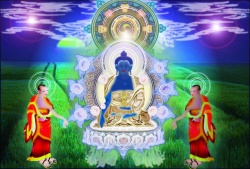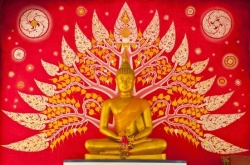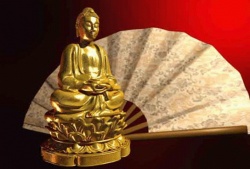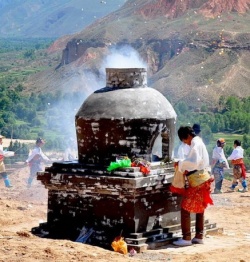Difference between revisions of "Aparājita"
(Created page with " Aparājitā (अपराजिता):—Sanskrit name of one of the thirty-two female deities of the Somamaṇḍala (second maṇḍala of the Khecarīcakr...") |
|||
| (One intermediate revision by the same user not shown) | |||
| Line 1: | Line 1: | ||
| + | <nomobile>{{DisplayImages|4285|1682|492|745}}</nomobile> | ||
| + | [[Aparājitā]] ([[अपराजिता]]):—[[Sanskrit]] [[name]] of one of the thirty-two [[female deities]] of the [[Somamaṇḍala]] (second [[maṇḍala]] of the [[Khecarīcakra]]) according to the [[kubjikāmata-tantra]]. | ||
| − | + | These [[goddesses]] are situated on a ring of sixteen petals and represent the thirty-two {{Wiki|syllables}} of the [[Aghoramantra]]. | |
| − | + | ||
| − | + | Each [[deity]] ([[including]] [[Aparājitā]]) is small, plump and large-bellied. | |
| + | |||
| + | They can assume any [[form]] at will, have sixteen arms each, and are all mounted on a different [[animal]]. | ||
| − | Aparājitā (अपराजिता, “[[invincible]], unsurpassed”):—Name of one of the sixty-four [[mātṛs]] to be worshipped during Āvaraṇapūjā (“ | + | [[Aparājitā]] ([[अपराजिता]], “[[invincible]], unsurpassed”):—Name of one of the sixty-four [[mātṛs]] to be worshipped during [[Āvaraṇapūjā]] (“[[Worship of the Circuit of Goddesses]]”, or “[[Durgā’s Retinue]]”), according to the [[Durgāpūjātattva]]. They should be worshipped with either the five [[upācāras]] or [[perfume]] and [[flowers]]. |
| Line 15: | Line 19: | ||
<poem> | <poem> | ||
ॐ अपराजित्यै नमः | ॐ अपराजित्यै नमः | ||
| − | [[oṃ]] | + | [[oṃ]] [[aparājitya namaḥ]]. |
</poem> | </poem> | ||
| − | + | [[Aparājita]] ([[अपराजित]]):—One of the [[Eleven Rudras]] ([[ekādaśa-rudra]]), according to the [[Agni-purāṇa]]. | |
| + | |||
| + | The [[Agni Purāṇa]] is a [[religious]] text containing details on Viṣṇu’s different [[incarnations]] ([[avatar]]), but also deals with various {{Wiki|cultural}} [[subjects]] such as [[Cosmology]], {{Wiki|Grammar}} and [[Astrology]]. | ||
| − | [[ | + | [[Aparājitā]] ([[अपराजिता]]):—One of the sixty-eight [[Rasauṣadhi]], very powerful [[drugs]] known to be useful in [[alchemical]] {{Wiki|processes}} related to {{Wiki|mercury}} ([[rasa]]), according to [[Rasaprakāśa-sudhākara]] ([[chapter]] 9). |
| − | Added: | + | Added: 29.Aug.2015 | [[Wisdom]] Library: [[Rasa-śāstra]] |
Rating: - | Rating: - | ||
| − | + | [[Aparājita]] ([[अपराजित]]):—Last of the eleven [[emanations]] of [[Rudra]] ([[ekādaśa-rudra]]), according to the [[Viśvakarma-śilpa]]. | |
| − | + | ||
| − | + | He carries in his right hands the [[tomara]], [[khaḍga]], [[aṅkuśa]], [[śula]], [[sarpa]], [[chakra]], [[ḍamaru]] and [[akṣamālā]]; and in the left hands the [[śakti]], [[kheṭaka]], [[gadā]], [[pātra]], [[tarjanī]], paṭṭīśa, [[padma]] and [[ghaṇṭa]]. | |
| + | |||
| + | |||
| + | [[Aparājita]],(adj.) ({{Wiki|Vedic}} [[aparājita]]; a + [[parājita]]) unconquered Sn.269; J.I,71,165. (Page 52) | ||
| − | |||
| − | |||
| − | |||
| − | + | [[aparājita]] : (adj.) unconquered. | |
| − | |||
| − | |||
| − | |||
| − | |||
| − | |||
1. [[Aparajita]] - One of the [[Pacceka Buddhas]] mentioned in the [[Isigili Sutta]]. M.iii.70; also ApA.i.107 and MA.ii.890. | 1. [[Aparajita]] - One of the [[Pacceka Buddhas]] mentioned in the [[Isigili Sutta]]. M.iii.70; also ApA.i.107 and MA.ii.890. | ||
| Line 45: | Line 46: | ||
2. [[Aparajita]] - A [[cakkavatti]] who lived seven [[kappas]] ago, an earlier [[birth]] of Avyadhika [[Thera]]. Ap.i.215. | 2. [[Aparajita]] - A [[cakkavatti]] who lived seven [[kappas]] ago, an earlier [[birth]] of Avyadhika [[Thera]]. Ap.i.215. | ||
| − | 3. [[Aparajita]] - A [[householder]] of Bandhumati. When his elder brother, [[Sena]], left the [[world]] and became an [[arahant]] under [[Vipassi Buddha]], [[Aparajita]] sought his advice as to how he could use his [[wealth]] to perform some act of great [[merit]]. He was asked [[to build]] a [[Gandhakuti]] for the [[Buddha]], which he did, using all manner of {{Wiki|precious metals}} and stones and surrounding it with various kinds of {{Wiki|luxury}}, such as perfumed [[water]]. The chamber was on three occasions filled knee deep with [[jewels]] to be taken by anyone who came to hear the [[Buddha]] {{Wiki|preach}}. At the opening of the [[Gandhakuti]], [[Aparajita]] entertained 6,800,000 [[monks]] for nine months. In this age he was born as the banker [[Jotika]]. In an earlier [[birth]] he had given sugar cane to a [[Pacceka Buddha]]. DhA.iv.199-207. | + | 3. [[Aparajita]] - A [[householder]] of [[Bandhumati]]. |
| + | |||
| + | When his elder brother, [[Sena]], left the [[world]] and became an [[arahant]] under [[Vipassi Buddha]], [[Aparajita]] sought his advice as to how he could use his [[wealth]] to perform some act of great [[merit]]. | ||
| + | |||
| + | He was asked [[to build]] a [[Gandhakuti]] for the [[Buddha]], which he did, using all manner of {{Wiki|precious metals}} and stones and surrounding it with various kinds of {{Wiki|luxury}}, such as perfumed [[water]]. | ||
| + | |||
| + | The chamber was on three occasions filled knee deep with [[jewels]] to be taken by anyone who came to hear the [[Buddha]] {{Wiki|preach}}. | ||
| + | |||
| + | At the opening of the [[Gandhakuti]], [[Aparajita]] entertained 6,800,000 [[monks]] for nine months. | ||
| + | |||
| + | In this age he was born as the banker [[Jotika]]. In an earlier [[birth]] he had given sugar cane to a [[Pacceka Buddha]]. DhA.iv.199-207. | ||
4. [[Aparajita]] - [[Nephew]] of the foregoing. He asked his uncle to let him have a share in the building of the [[Gandhakuti]], but was refused. So he built an [[elephant]] {{Wiki|stable}} next to it. | 4. [[Aparajita]] - [[Nephew]] of the foregoing. He asked his uncle to let him have a share in the building of the [[Gandhakuti]], but was refused. So he built an [[elephant]] {{Wiki|stable}} next to it. | ||
Latest revision as of 05:26, 26 March 2016
Aparājitā (अपराजिता):—Sanskrit name of one of the thirty-two female deities of the Somamaṇḍala (second maṇḍala of the Khecarīcakra) according to the kubjikāmata-tantra.
These goddesses are situated on a ring of sixteen petals and represent the thirty-two syllables of the Aghoramantra.
Each deity (including Aparājitā) is small, plump and large-bellied.
They can assume any form at will, have sixteen arms each, and are all mounted on a different animal.
Aparājitā (अपराजिता, “invincible, unsurpassed”):—Name of one of the sixty-four mātṛs to be worshipped during Āvaraṇapūjā (“Worship of the Circuit of Goddesses”, or “Durgā’s Retinue”), according to the Durgāpūjātattva. They should be worshipped with either the five upācāras or perfume and flowers.
Her mantra is as follows:
ॐ अपराजित्यै नमः
oṃ aparājitya namaḥ.
Aparājita (अपराजित):—One of the Eleven Rudras (ekādaśa-rudra), according to the Agni-purāṇa.
The Agni Purāṇa is a religious text containing details on Viṣṇu’s different incarnations (avatar), but also deals with various cultural subjects such as Cosmology, Grammar and Astrology.
Aparājitā (अपराजिता):—One of the sixty-eight Rasauṣadhi, very powerful drugs known to be useful in alchemical processes related to mercury (rasa), according to Rasaprakāśa-sudhākara (chapter 9).
Added: 29.Aug.2015 | Wisdom Library: Rasa-śāstra
Rating: -
Aparājita (अपराजित):—Last of the eleven emanations of Rudra (ekādaśa-rudra), according to the Viśvakarma-śilpa.
He carries in his right hands the tomara, khaḍga, aṅkuśa, śula, sarpa, chakra, ḍamaru and akṣamālā; and in the left hands the śakti, kheṭaka, gadā, pātra, tarjanī, paṭṭīśa, padma and ghaṇṭa.
Aparājita,(adj.) (Vedic aparājita; a + parājita) unconquered Sn.269; J.I,71,165. (Page 52)
aparājita : (adj.) unconquered.
1. Aparajita - One of the Pacceka Buddhas mentioned in the Isigili Sutta. M.iii.70; also ApA.i.107 and MA.ii.890.
2. Aparajita - A cakkavatti who lived seven kappas ago, an earlier birth of Avyadhika Thera. Ap.i.215.
3. Aparajita - A householder of Bandhumati.
When his elder brother, Sena, left the world and became an arahant under Vipassi Buddha, Aparajita sought his advice as to how he could use his wealth to perform some act of great merit.
He was asked to build a Gandhakuti for the Buddha, which he did, using all manner of precious metals and stones and surrounding it with various kinds of luxury, such as perfumed water.
The chamber was on three occasions filled knee deep with jewels to be taken by anyone who came to hear the Buddha preach.
At the opening of the Gandhakuti, Aparajita entertained 6,800,000 monks for nine months.
In this age he was born as the banker Jotika. In an earlier birth he had given sugar cane to a Pacceka Buddha. DhA.iv.199-207.
4. Aparajita - Nephew of the foregoing. He asked his uncle to let him have a share in the building of the Gandhakuti, but was refused. So he built an elephant stable next to it.
In the present age he was the banker Mendaka. DhA.iv.203.



